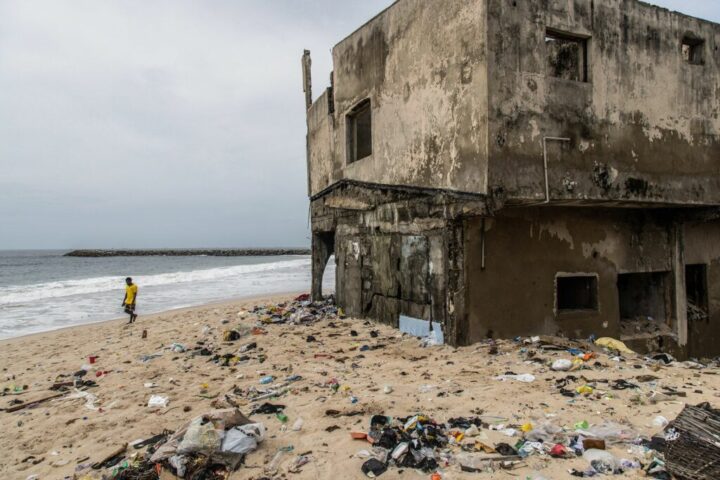The Office of the Surveyor-General of the Federation (OSGoF) has raised concerns over the growing number of illegal structures springing up along Nigeria’s shorelines, warning that such developments not only contravene existing laws but also threaten the environment, public safety, and national infrastructure.
Surveyor-General of the Federation, Abuduganiyu Adeyemi Adebomehin, said his office has completed an extensive mapping exercise that identified several unapproved constructions along coastal corridors in Lagos, Rivers, Delta, Cross River, and other littoral states. According to him, these structures — many of them private estates, hotels, and makeshift commercial hubs — were erected without proper approvals and pose dangers to both human settlements and marine ecosystems.

Adebomehin, while speaking at a media briefing in Abuja, explained that the survey was carried out in collaboration with state planning authorities, federal environmental agencies, and security outfits to ensure accuracy and credibility. He noted that the findings revealed rampant disregard for planning laws, as developers encroached into buffer zones meant for drainage, flood protection, and shoreline stabilisation.
“Illegal shoreline structures are ticking time bombs. They increase the risk of flooding, undermine coastal resilience, and endanger lives and properties. As part of our responsibility to safeguard the nation’s geospatial integrity, we have identified these areas for urgent demolition to prevent further disaster,” he declared.
The Surveyor-General emphasised that the demolition exercise is not intended to witch-hunt individuals but to enforce compliance and protect national interest. He added that the demolition plan will be executed in phases, starting with high-risk locations already exposed to tidal surges and severe erosion.
Experts have long warned about the dangers of uncontrolled coastal development in Nigeria, where sea level rise and extreme weather patterns linked to climate change have heightened vulnerability. Communities in Lagos Island, Bonny, Warri, and Calabar have in recent years experienced recurrent flooding, worsened by blocked waterways and reduced natural buffers.
Urban and environmental planners say the Surveyor-General’s move is timely and necessary. Dr. Folake Oseni, an environmental consultant, noted that while demolitions can be politically sensitive, they remain critical for ensuring sustainable shoreline management. “The hard truth is that illegal constructions along coastal belts expose us to greater risks. Clearing them is not just about enforcing the law; it is about safeguarding the future of millions of Nigerians,” she remarked.
However, some residents and property developers are already expressing concerns. A Lagos-based developer, who requested anonymity, argued that many of the affected structures were built with tacit approval from local officials. He urged the federal government to exercise caution and provide compensation for lawful property owners. “We agree that the environment must be protected, but government must also acknowledge that corruption within local authorities enabled some of these developments in the first place,” he said.
In response, Adebomehin assured that his office is coordinating with relevant ministries and agencies to ensure due process. He stressed that a verification mechanism will be put in place to separate outright illegal developments from cases where owners may have been misled by compromised officials. He further disclosed that OSGoF is working on a national coastal management policy that will establish clear guidelines for future shoreline development.
The demolition drive also aligns with Nigeria’s broader climate adaptation agenda. Under the Nationally Determined Contributions (NDCs) submitted to the United Nations Framework Convention on Climate Change (UNFCCC), the country has pledged to strengthen coastal protection as part of its mitigation and resilience strategies. Experts believe that removing illegal shoreline encroachments will support this goal and reduce financial losses from flooding and erosion disasters.
Civil society organisations have thrown their weight behind the initiative. The Nigerian Environmental Protection Alliance (NEPA) lauded the Surveyor-General’s office, urging state governments to follow suit by tackling unregulated land use. “What we see in Lagos, Port Harcourt, and Warri is a pattern of disregard for the law. Powerful individuals acquire sensitive land and build recklessly. This demolition exercise will send a strong message that the era of impunity must end,” said NEPA’s Director, Chike Opara.
At the same time, some experts are calling for a humane approach. They recommend that alongside demolitions, government should offer relocation support and compensation, particularly to low-income families whose livelihoods depend on fishing and small-scale businesses along the coast.
The Surveyor-General acknowledged these concerns, saying government will balance enforcement with compassion. “We will not throw citizens into undue hardship. The government is looking at options for relocation and livelihood support, but the priority is to save lives and prevent further environmental catastrophe,” Adebomehin said.
Beyond demolitions, the OSGoF announced plans to deploy satellite imagery, drones, and modern geospatial technologies to continuously monitor Nigeria’s coastline. The aim is to prevent illegal developments from taking root in the future, while providing reliable data for policymakers.
With Nigeria’s coastal population projected to grow rapidly over the next decade, experts stress that decisive action today will prevent bigger disasters tomorrow. The coming months will therefore be critical, as the Surveyor-General’s office begins implementing its demolition programme and testing the political will of government to enforce laws without fear or favour.
For now, the identification of illegal shoreline structures marks a turning point in Nigeria’s quest for sustainable coastal management. Whether the planned demolitions will be fully carried out and resisted by vested interests remains to be seen, but stakeholders agree that the move is necessary for national safety, environmental preservation, and responsible urban planning.
Support InfoStride News' Credible Journalism: Only credible journalism can guarantee a fair, accountable and transparent society, including democracy and government. It involves a lot of efforts and money. We need your support. Click here to Donate
